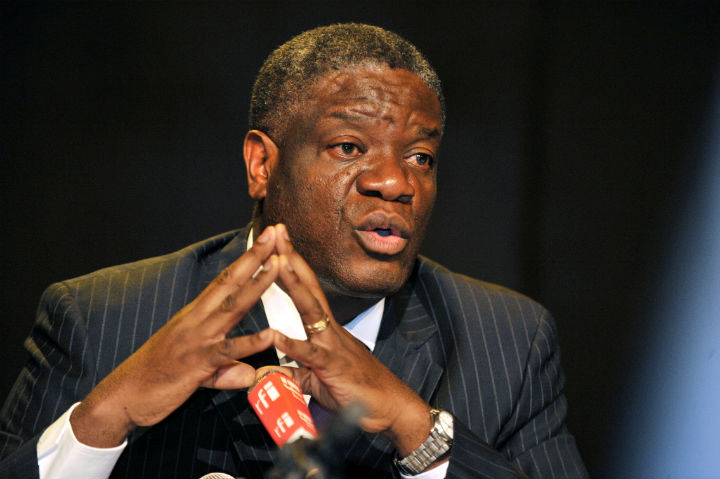Denis Mukwege has been lauded multiple times for his work treating tens of thousands of rape victims and survivors of sexual violence in the Democratic Republic of Congo, but the one recognition that has eluded him is the Nobel Peace Prize.

He’s among 273 nominees this year and is once again one of the top contenders to receive the prestigious award, according to betting agencies.
But despite being nominated year after year, the Nobel committee has chosen other noteworthy individuals and organizations.
Last year, renowned teenage activist Malala Yousafzai and Kailash Satyarthi shared the prize for their work protecting the rights of children. In 2013, it was the Organization for the Prohibition of Chemical Weapons.
READ MORE: Canadian Arthur McDonald shares Nobel Prize in physics with Takaaki Kajita of Japan
The 60-year-old gynecologist has reportedly saved the lives of more than 40,000 women and girls in his country, providing reconstructive surgeries to the victims of gang rapes — in many cases by soldiers and rebel fighters during the nearly five-year Second Congo War and the violence that has persisted in the eastern part of the country since the formal end of the war.
At the Panzi Hospital, which he founded in 1999, staff deal with 10 rape cases each day.
He has risked his life for his work: in 2012, someone tried to kill him after he condemned armed groups for using rape as a weapon of war.
“It is a method of torture. It is a way to terrorise the population. When I see some of the injuries on the women and children, I realize this type of violence has little to do with sex and much more with power through a sort of terrorism,” he told the Guardian in May.
- Buzz kill? Gen Z less interested in coffee than older Canadians, survey shows
- Naloxone-resistant street drug linked to 9 deaths in Eastern Canada seized in Alberta
- Bird flu risk to humans an ‘enormous concern,’ WHO says. Here’s what to know
- ‘She gets to be 10’: Ontario child’s heart donated to girl the same age
READ MORE: Belarusian writer Svetlana Alexievich wins Nobel literature prize for depictions of suffering
Mukwege’s work would certainly benefit from the worldwide notoriety that goes with winning the Nobel Peace Prize —not to mention the 8 million Swedish krona (CDN $1.26 million) the recipient receives.
It’s not that his work has gone unnoticed: Mukwege has been awarded the UN Human Rights prize; France has named him a Knight of the Legion of Honour; and last year the European Parliament awarded him the Sakharov Prize for Freedom of Thought — an award that Yousafzai received the year before winning her Nobel Peace Prize.
While that might seem to bode well for Mukwege’s chances of becoming the 129th Nobel Peace laureate since 1901, oddsmakers are hedging their bets on other nominees.
Across the board, German Chancellor Angela Merkel appears to be the favourite, for her leadership amid the European refugee crisis and opening Germany’s borders to an estimated 1 million refugees and migrants by the end of this year. In a year when the situation for refugees has become the most desperate since Second World War, Merkel’s not a lock to win and some feel the award should not go to someone who already has global recognition.
“Merkel is a deserving nominee, but she already has a spotlight,” Jonathan Hutson, who worked with the 1997 Nobel Peace Prize-winning International Campaign to Ban Landmines, told Al Jazeera. “It’s more useful to bring rights activists who struggle to get their voices heard from the margins to the centre of the stage.”
READ MORE: Nobel Prize in chemistry awarded to three scientists for work on DNA
Others whose chances favour highly include Pope Francis; U.S. Secretary of State John Kerry and Iranian Foreign Minister Javad Zarif for their work on the Iran nuclear deal; independent Russian newspaper Novaya Gazeta — a publication that was founded with the money Mikhail Gorbachev received for his 1990 Nobel Peace Prize — for coverage of the war in Ukraine; and the Japanese people working to conserve Article 9, the clause in the Japanese constitution which prevented Japan from sending military forces overseas.
The winner of the Nobel Peace Prize will be announced Friday at the Norwegian Nobel Institute in Oslo at 11:00 a.m. local time (5:00 a.m. ET).




Comments